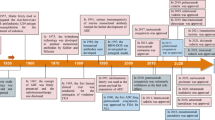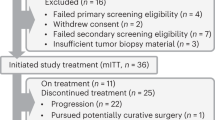Abstract
There is a need to improve the treatment of superficial bladder cancer. One area which holds promise is intravesical gene therapy. Recently, studies undertaken by us have shown that marked tumor regression of bladder cancers occurred after two daily intravesical administrations of an adenovirus encoding human interferon α (Ad-IFNα) using a mouse superficial bladder cancer model in which human bladder tumors are growing. A dose of 1 × 1011 particles/ml (P/ml) was used along with 1 mg/ml of Syn3, a gene transfer-enhancing agent. Since clinical studies are being planned using this approach, it became critical to determine if one exposure and lower particle number could be equally effective. We report that indeed a single dose of Ad-IFNα in Syn3 at doses of 1 × 1010–1 × 1011 P/ml is highly effective in reducing the size of the tumors, whereas 1 × 109 P/ml was not. Efficacy was also correlated with the level of IFN produced in the urine after treatment. Based on the results of the present studies, a Phase I trial is being planned for superficial bladder cancer, which will involve a single initial treatment with Ad-IFNα/Syn3 and measurement of IFN in the urine over time as an indicator of adequate gene transfer and expression.
This is a preview of subscription content, access via your institution
Access options
Subscribe to this journal
Receive 12 print issues and online access
$259.00 per year
only $21.58 per issue
Buy this article
- Purchase on Springer Link
- Instant access to full article PDF
Prices may be subject to local taxes which are calculated during checkout



Similar content being viewed by others
References
Herr HW . Tumor progression and survival of patients with high grade, noninvasive papillary (TaG3) tumors: 15-year outcome. J Urol 2000; 163: 60–61.
Dalbagni G, Herr HW . Current use and questions concerning intravesical bladder. Cancer Group for Superficial Bladder Cancer. Urol Clin North Am 2002; 27: 137–146.
O'Donnell MA, Krohn J, DeWolf WC . Salvage intravesical therapy with interferon-alpha 2b plus low dose bacillus Calmette-Guerin is effective in patients with superficial bladder cancer in whom bacillus Calmette-Guerin alone previously failed. J Urol 2001; 166: 1300–1304.
Izawa JI, Sweeney P, Perrotte P, Kedar D, Dong Z, Slaton JW et al. Inhibition of tumorigenicity and metastasis of human bladder cancer growing in athymic mice by interferon-beta gene therapy results partially from various antiangiogenic effects including endothelial cell apoptosis. Clin Cancer Res 2002; 8: 1258–1270.
Connor RJ, Engler H, Machemer T, Philopena JM, Horn MT, Sutjipto S et al. Identification of polyamides that enhance adenovirus-mediated gene expression in the urothelium. Gene Therapy 2001; 8: 41–48.
Yamashita M, Rosser CJ, Zhou JH, Zhang XQ, Connor RJ, Engler H et al. Syn3 provides high levels of intravesical adenoviral-mediated gene transfer for gene therapy of genetically altered urothelium and superficial bladder cancer. Cancer Gene Ther 2002; 9: 687–691.
Watanabe T, Shinohara N, Sazawa A, Harabayashi T, Ogiso Y, Koyanagi T et al. An improved intravesical model using human bladder cancer cell lines to optimize gene and other therapies. Cancer Gene Ther 2002; 7: 1575–1580.
Zhou JH, Rosser CJ, Tanaka M, Yang M, Baranov E, Hoffman RM et al. Visualizing superficial human bladder cancer cell growth in vivo by green fluorescent protein expression. Cancer Gene Ther 2002; 9: 681–686.
Benedict WF, Tao Z, Kim CS, Zhang X, Zhou JH, Adam L et al. Intravesical Ad-IFNα causes marked regression of human bladder cancer growing orthotopically in nude mice and overcomes resistance to IFN-α protein. Mol Ther 2004; 10: 525–532.
Streuli M, Hall A, Boll W, Stewart WE, Nagata S, Weissmann C . Target cell specificity of two species of human interferon-alpha produced in Escherichia coli and of hybrid molecules derived from them. Proc Natl Acad Sci USA 1981; 78: 2848–2852.
Rehberg E, Kelder B, Hoal EG, Pestka S . Specific molecular activities of recombinant and hybrid leukocyte interferons. J Biol Chem 1982; 257: 11497–11502.
Ahmed CM, Wills KN, Sugarman BJ, Johnson DE, Ramachandra M, Nagabhushan TL et al. Selective expression of nonsecreted interferon by an adenoviral vector confers antiproliferative and antiviral properties and causes reduction of tumor growth in nude mice. J Interferon Cytokine Res 2001; 21 (6): 399–408.
Iqbal-Ahmed CM, Johnson DE, Demers GW, Engler H, Howe JA, Wills KN et al. Interferon alpha2b gene delivery using adenoviral vector causes inhibition of tumor growth in xenograft models from a variety of cancers. Cancer Gene Ther 2001; 8: 788–795.
Conover WJ . Practical Nonparametric Statistics, 3rd edn. New York: John Wiley & Sons, Inc., 1999.
Acknowledgements
We thank Dr Daniel Maneval for his review of this manuscript and helpful comments. This work was supported by the GU SPORE Grant P50 CA091846 and the Cancer Center Support (Core) Grant CA16672 from the NIH.
Author information
Authors and Affiliations
Corresponding author
Rights and permissions
About this article
Cite this article
Tao, Z., Connor, R., Ashoori, F. et al. Efficacy of a single intravesical treatment with Ad-IFN/Syn 3 is dependent on dose and urine IFN concentration obtained: implications for clinical investigation. Cancer Gene Ther 13, 125–130 (2006). https://doi.org/10.1038/sj.cgt.7700865
Received:
Accepted:
Published:
Issue Date:
DOI: https://doi.org/10.1038/sj.cgt.7700865
Keywords
This article is cited by
-
Nadofaragene firadenovec in high-risk Bacillus Calmette Guérin unresponsive non-muscle invasive bladder cancer: a profile of its use
Drugs & Therapy Perspectives (2024)
-
Recurrence mechanisms of non-muscle-invasive bladder cancer — a clinical perspective
Nature Reviews Urology (2022)
-
The development of interferon-based gene therapy for BCG unresponsive bladder cancer: from bench to bedside
World Journal of Urology (2019)
-
Current Clinical Trials in Non-muscle Invasive Bladder Cancer
Current Urology Reports (2018)
-
Use of monitoring levels of soluble forms of cytokeratin 18 in the urine of patients with superficial bladder cancer following intravesical Ad-IFNα/Syn3 treatment in a phase l study
Cancer Gene Therapy (2014)



